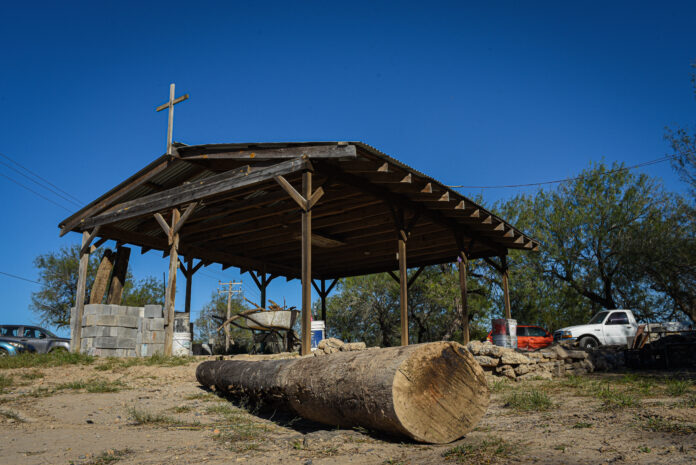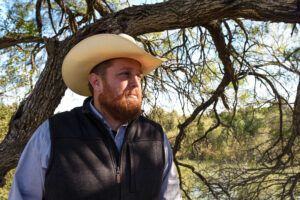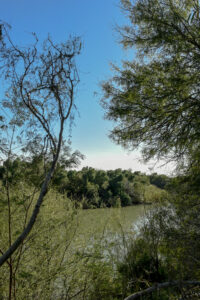
A small border ranch ensconced in an impoverished Reynosa riverbank neighborhood was for years maintained by a family, a church ministry, and a promise from God, the owner said. Last week, the property that served as the site of an early evangelical church was given renewed purpose when a partnership formed to build it into a refuge for migrants and the forgotten.

(Courtesy Image)
“We really prayed and asked the Lord, we need to do something,” Pastor Joshua Muse, director of Kaleo International, said Monday afternoon at the ranch. His blue eyes gazed over the property he purchased years ago.
Earlier that day, pastors and members of the nondenominational Christian congregations established through Muse’s efforts in Reynosa showed up to pray and begin the work to clear the land less than 2 miles from the Hidalgo-Reynosa International Bridge.
Thousands of migrants, including children, women and families, continue to live a block away from the bridge after U.S. policies enacted at the start of the pandemic have closed the door to asylum cases.
Conditions began deteriorating quickly at the Plaza de las Americas, where migrants began to huddle in tents, under tarps and in other makeshift shelters since April 2021. It prompted the city to threaten to dismantle it, efforts that have continued behind closed doors.
A chance encounter in late December between two of several nongovernmental organizations and churches helping migrants in Reynosa led to the decision to create a shelter specifically for migrant families, women and children.
Though Muse is a U.S. citizen, he and his family have lived in the Mexican border city where God called him to move his ministry eight years ago, he said.
Over that time, Kaleo International has helped Reynosa children and adults living in poverty, stuck in cycles of addiction, and helped provide a way into a healthier life. When migrants began crowding into the plaza, Muse began helping organizations like Senda de Vida, the largest migrant shelter, with donations.

(Courtesy Image)
“When we saw that Senda de Vida was at max capacity and the other ministries, the other churches that were willing to take in people, were at max capacity and how horrible the situation really is. We really prayed,” Muse recalled.
During the December meeting, Muse spotted someone he felt could help.
“While I was getting coffee, he came up behind me and introduced himself,” Felicia Rangel-Samponaro, a co-founder of the Sidewalk School, said. Her organization is U.S.-based and focuses on educating children and sheltering migrants.
“Pastor Josh,” Rangel-Samponaro recalled Tuesday, “told me about some properties that he owns in Reynosa and how he would like to start helping to house the asylum seekers who live inside the Reynosa encampment and give them a safe place to live.”
Days after they met, Muse, Rangel-Samponaro and Victor Cavazos, Sidewalk School co-founder, toured two properties they ruled out due to their long distance from the bridge. Then they went to a third property acquired by Muse in 2016 located less than five minutes from Senda de Vida.
“Once we saw it, Victor and I both said, this is perfect,” Rangel-Samponaro said. They signed a contract to fund the construction on Muse’s property.
Another pastor and his family currently live and look after the land, but Muse said they’re going to reshape it to make room for more families.
The plan is still under development, but they envision two-story dormitories with bunk beds for up to 300 people consisting of migrant women, children and families.
Walls will be erected along the perimeter and a chain-link fence will be added near the river to allow for water flow. Muse said they will also reinforce the riverbank where there’s been deterioration.
Migrants who will move there will have opportunities for personal growth.
“We want to start like a vocational sort of training here,” Muse added, like teaching carpentry, piñata-making, or other trades.
Pigs and chickens are currently living on the property. They plan to add goats and fruit trees.
Muse, who was raised on a farm, hopes the pastoral setting will give migrants who come from agrarian backgrounds a sense of normalcy.
A large church and multi-purpose center will also be constructed to create a space for migrant children to take classes from the Sidewalk School and their families to meet their spiritual needs as pastors from around the community visit to hold church services.
“They can encounter God in a special way as they’re waiting to see where they’re going to go next,” Muse said.
In some ways, the land will be returning to its original use from yesteryear.
Older neighbors informed Muse the land, where a concrete foundation remains, was the first evangelical church planted in the area about 70 years ago.
“We felt it was a significant thing for this place, that God would choose this place, to be a refuge for people who are fleeing violence, fleeing difficult situations, because that’s really what the church should be,” Muse said.
The team still needs to acquire some permits but construction will be moving at a brisk pace, Rangel-Samponaro said.
Once the shelter has outlived its purpose for migrants, Muse will keep the dormitories and hopes it will become a transformative place ushering the rehabilitation of Reynosa residents who want to leave addiction and prostitution behind.
The ministry, www.kaleointernational.org, and nongovernmental organization, www.sidewalkschool.org/donate-2, are requesting the public to help with donations and support.
For Muse, the work is more than remedying a problem, but a duty rooted in faith and biblical principle.
“There’s certain people that the Lord really calls us to help as the church: the widows, the orphans, the poor. But, I believe that also includes the refugees,” Muse said. “Be kind to the strangers; be kind to the foreigners in your land.”



